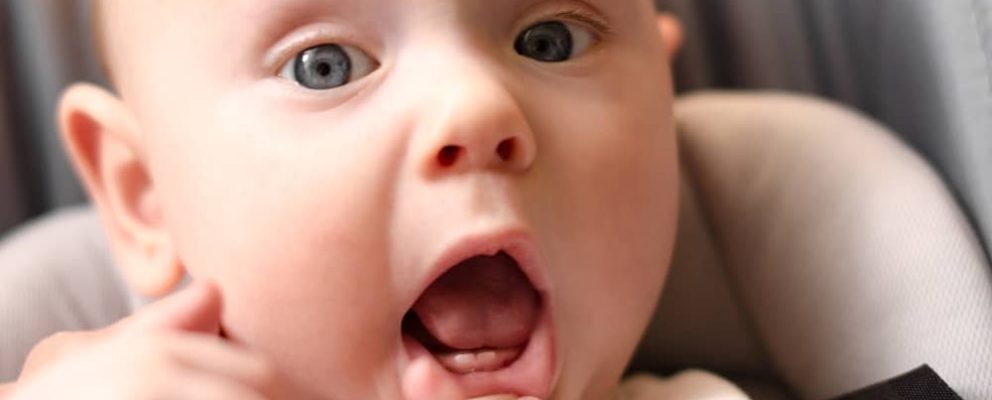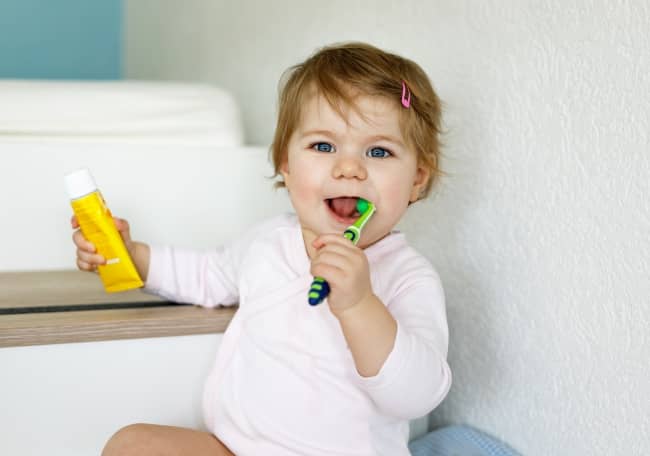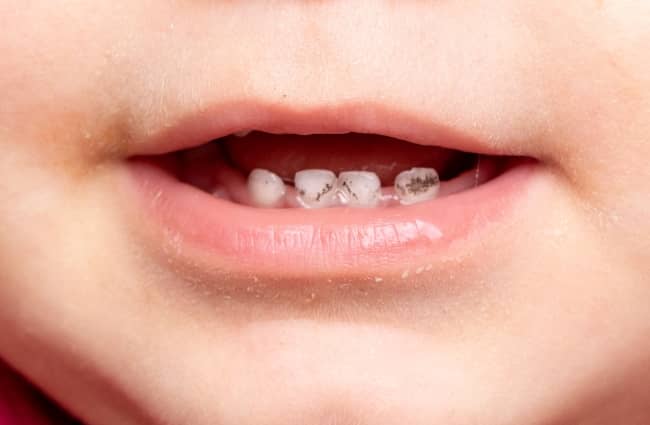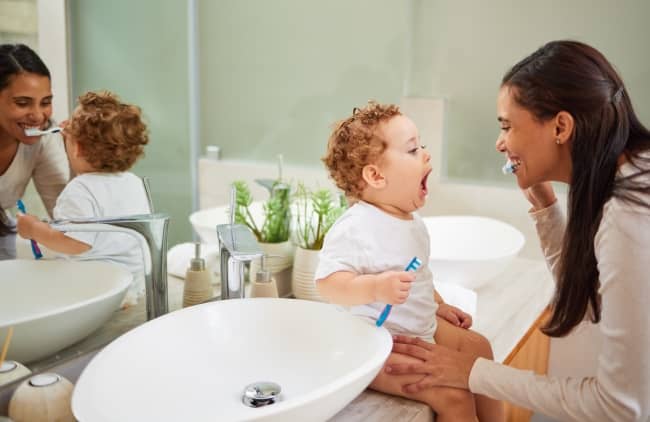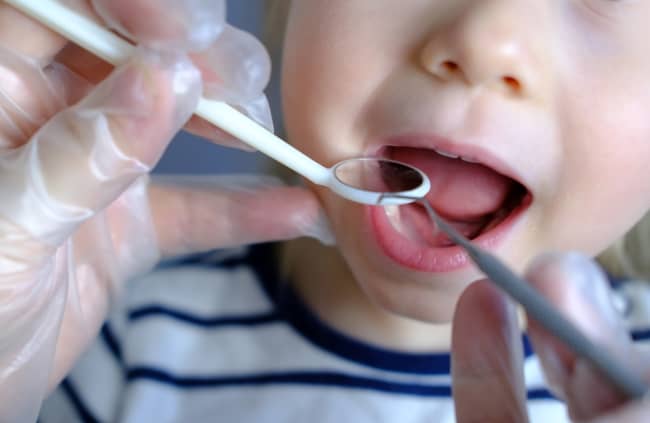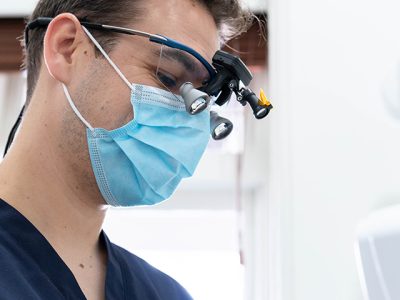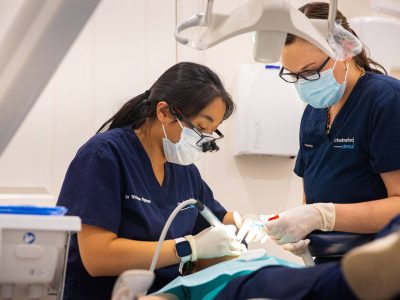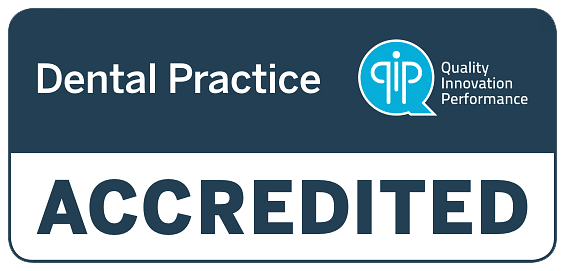Did you know cavities can occur faster in baby teeth than in adult teeth?
Most children will have all of their baby teeth by the time they reach 3 years old. It is important to help your child keep their mouth, gums, and baby teeth healthy to prevent cavities and hold space for their adult teeth.
Establishing a good oral hygiene routine early on will help get your child in the habit of properly caring for their teeth, mouth, and gums.
In this article, we’ll cover tips on how to properly care for your child’s baby teeth, as well as frequently asked questions about children’s oral health.
How to Properly Care For Your Child’s Baby Teeth
Start Early
Your baby’s teeth form during pregnancy, meaning your baby already has fully formed teeth in his or her jaw at the time of birth.
Even before your baby’s first tooth appears, it is important to keep their mouth clean by gently wiping their gums with a clean, damp cloth or gauze after feedings.
Use the Right Toothbrush
Once your child’s teeth start coming in, it is time to start using a toothbrush. Choose a toothbrush specifically designed for children.
Child toothbrushes often have soft bristles, fun colours and characters, and handles and brush heads designed for the smaller size of a child’s hands and mouth.
Opt for Fluoride Toothpaste
Choose a fluoride toothpaste with the ADA (Australian Dental Association) seal. For younger children who may not be able to spit out toothpaste properly, opt for low-fluoride toothpaste. Use the tiniest bit of toothpaste (roughly the size of a grain of rice if your child is under 3).
Teach Proper Brushing Habits
Encourage your child to brush their teeth twice a day, and supervise them until they’re old enough to do it properly on their own.
Also, make sure they’re using the right technique – brush gently in circular motions, and be sure to clean all surfaces of the teeth and along the gumline.
Show them how to hold the toothbrush, how to make circular motions, and how to gently brush all surfaces of the teeth. After your child is done brushing, follow up to ensure they effectively brushed all surfaces.
Once your child is old enough, usually around age 2, emphasize the importance of spitting out excess toothpaste while brushing.
Start Flossing Early
When should I floss my baby’s teeth?
This is a common question, and the answer may be sooner than you think. As soon as your baby has two teeth that touch, you can floss between them. You can also gently brush their tongue with the toothbrush.
Watch Your Child’s Diet
Sugary and acidic foods can be especially harmful to baby teeth, so try to limit your child’s intake of sugary snacks and drinks. Encourage healthy foods like fruits, vegetables, and dairy products.
Schedule Regular Dental Checkups
Your child should see a dentist for the first time around their first birthday, and then every six months after that. General dental checkups are more than just professional teeth cleanings.
These visits are important for identifying any potential oral health problems early on. Early detection is key in preventing complications and reducing treatment time and cost.
Watch for Signs of Tooth Decay
Even babies are at risk of tooth decay. Putting your baby down with a bottle can be especially harmful to teeth since it allows prolonged contact of the sugars in formula, milk, or juice with your baby’s teeth. This can result in “bottle mouth”, a condition that causes cavities and discolouration.
Consider Fluoride Treatments
If your dentist recommends it, fluoride treatments can help strengthen your child’s teeth and prevent cavities.
Ask your dentist for recommendations on fluoride toothpaste for your children. You can also check with your dentist to see if your child should be drinking fluoridated water.
Be Prepared for Teething
During teething, you may notice your child is fussier than normal. Your child may also have a low-grade fever for a day or two and drool more than usual. Teething can be a difficult time for both parents and children, but you can do things to ease your child’s discomfort.
Give your child teething toys or a chilled, damp washcloth to chew on, and talk to your dentist about other remedies like topical numbing gels. You can also try gently rubbing your child’s gums using a clean finger to help soothe their pain.
Set a Good Example
Finally, remember that children learn by example. By ensuring you are taking good care of your teeth and gums, your child will be more likely to follow suit.
Follow a good oral hygiene routine so your child sees you brushing your teeth and flossing daily, eating a healthy diet, and attending regular dental checkups.
Related Reading: How To Clean Your Teeth Properly
When Should a Child First See the Dentist?
As recommended by the Australian Dental Association, children should have their first dental visit within six months of their first tooth erupting, or by their first birthday.
These early dental visits are important as they can help get your child comfortable with seeing a dentist. Dental checkups also ensure that any dental issues are identified and addressed as early as possible.
At your child’s first dental visit, you can even have your baby sit right on your lap to keep them comfortable.
Along with checking for any oral health issues, your dentist can answer your questions about caring for your child’s teeth, educate you on proper brushing and flossing habits and techniques, and make sure your child’s teeth are developing properly.
Why Is It Important to Keep Baby Teeth Healthy?
Since baby teeth fall out, people often wonder why healthy baby teeth matter.
Healthy baby teeth are important for:
- Forming face shape
- Making it easier to chew and eat
- Holding spaces open so permanent teeth have room to come in
- Supporting clear speech
Other Ways to Keep Your Child’s Baby Teeth Healthy
You can help keep your child’s teeth, mouth, and gums healthy with these steps:
- Let your child have a say in picking out a toothbrush.
- Get creative with brushing so your child is more likely to stick to a brushing routine. You can sing a song as your child brushes, put on music for two minutes, use sticker or reward charts, or create songs about keeping your teeth healthy.
- Use the correct amount of toothpaste (about the size of a grain of rice if your child is under the age of 3; kids aged 3 to 6 can use a pea-sized amount of toothpaste).
- Supervise kids 8 and under when brushing and remind them to spit out extra toothpaste, not swallow it.
- Encourage your child to eat and drink at mealtimes rather than frequently throughout the day.
- Only use a bottle at feeding time and do not allow your child to fall asleep with a bottle.
- Once your child’s first tooth comes in, try to avoid frequent feedings or night feedings.
- Try weaning your baby from a bottle to a cup by the time they are a year old.
- Encourage your child to drink water throughout the day, but do not give drinks other than water between meals.
- Limit your child’s intake of sugary drinks or juice.
- Avoid giving your child sticky, chewy foods such as gummies that get stuck on teeth.
- Ask your child what toothpaste flavour they would like and allow them to try different flavours to see which one they like the most.
- Call your dentist if your child is complaining of tooth pain (this could indicate a cavity).
Ready to Schedule a Dental Checkup for Your Child?
Chelmsford Dental is your dedicated Perth family dentist. Our staff creates a relaxed, anxiety-free atmosphere — for patients of all ages.
We enjoy working with all of our patients, from our youngest to our oldest patients! Helping children establish healthy oral hygiene habits early on is one of our missions. Our skilled staff is excellent at making sure kids feel comfortable at the dentist’s.
If you have questions about your child’s baby teeth, when you should schedule your child’s first dentist visit, or have other questions about your child’s oral health, please contact us.
Our team is always happy to answer your questions or help you book an appointment. We’re here to help get your child build a foundation for a lifetime of healthy teeth and gums.
